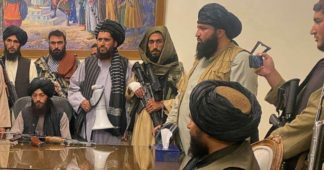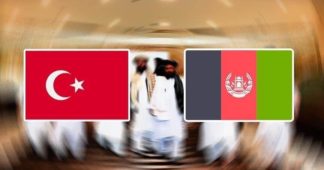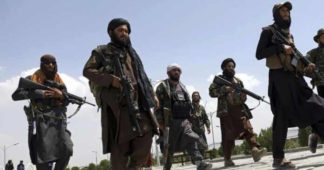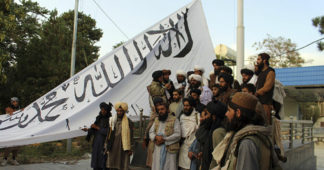Farah Adeed discusses the ways in which the Taliban will revive the Islamist movements in Afghanistan now that they are ruling the country again. He further talks about how the implementation of Sharia Law will lead to reviving the narratives that are established by the West about Islam
Farah Adeed
After an apparent defeat of the United States, the Taliban are in power in Afghanistan. Whether the defeat is due to “a fecklessness and incompetence” of the Afghan forces or the result of an alleged political settlement between the Taliban and the US, it is still a controversial subject.
Some analysts in Islamabad are of the view that the swiftness with which the Taliban captured Afghanistan and the unceremonious (rather humiliating) dismissal of the US-installed administration in Kabul reveal the fact that a deal was struck by the Taliban with the US.
However, Islamist political parties and pro-Taliban public intellectuals are of the view that the Taliban have defeated the superpower and reclaimed their land. Their argument is that this victory was promised by God to these “young brave men” who were fighting for His cause. These intellectuals, ulema, and certain segments of society have also found a quote from the 12-minute interview of Mullah Omar Mohammad, the founder of the Taliban struggle, with Voice of America (VOA) in 2001.
VOA: “Do you know that the US has announced a war on terrorism?”
Mullah Omar’s answer: “I am considering two promises. One is the promise of God, the other is that of Bush. The promise of Bush is that there is no place on earth where you can hide that I cannot find you. We will see which one of these two promises is fulfilled.”
This latter narrative that the Taliban’s victory was promised by God has the potential to negatively impact the prospects, if any, of democracy in the Muslim world. The Taliban-minded people in the Muslim world already treat democracy or the idea of individual freedoms as the antithesis to Islam and its history.
A few days ago, Waheedullah Hashimi, who has access to the Taliban’s decision-making, told Reuters that there will be no democracy in Afghanistan. “We will not discuss what type of political system should we apply in Afghanistan because it is clear. It is Sharia law and that is it,” he said.
As the Taliban are ready to run Afghanistan, there are three reasons to assess as to how their victory and subsequent rule can revive Islamist discourse in countries like Pakistan. This revival, I would argue, will ultimately set the stage for the resurgence of Islamist Movements.
Is Islam the solution to counter western modernity?
The new political belief, which probably was already an integral part of popular culture in most of the Muslim majority countries, now almost got legitimized that the only way to counter American interventionism and cultural hegemony is to Islamize society, cultural discourse, and political order. Similarly, Islamists firmly believe that the only way to fix backward economies, revisit anti-science approaches, and end political authoritarianism is to implement Sharia.
At this moment, the Taliban are likely to get funding from the US, China, and some other countries which will potentially reinforce the beliefs: implementation of Sharia in Afghanistan helped the Taliban stabilize a failing economy and a collapsing society.
God helped the Taliban defeat two superpowers
The Union of Soviet Socialist Republics (USSR) and the United States, so the system they will implement will be Islamic in a real sense. Many in Pakistan celebrated the victory of the Taliban as a sign of the beginning of a new World Order led by Muslims. The belief that the mujahideen can defeat any so-called superpower is the result of a unique historical experience.
The mujahideen – the precursors to the Taliban -with the help of the US, Saudi Arabia, and Pakistan defeated the USSR in the 1980s. Taliban then emerged as the mujahideen of the mujahideen to stamp warriors, and hence, the political authority on much of Afghanistan. The same group successfully captured Kabul and forced the US for a graceless exit. The Taliban sympathizers view it as the power of faith and blessing of Allah the beginning of the Talibanisation Renaissance.
Such a thinking pattern leads us to conclude that the system these pious men are going to establish will be Islamic in letter and spirit. Resultantly, a Talibanized political order seems to be in the offing. For example, a ban on co-education, consumption of alcohol, and free speech are considered ideal principles of an Islamic society. The Taliban are certain to do it, and the popular support from countries like Pakistan shall just pour in.
The revival of the Western narrative against Islam
Until the 1970s, the Muslim World was particularly dominated by the secularists who introduced political order based on the ideals of “assertive secularism” in a stark contradiction to what happens in a liberal democracy. However, the last half of the 20th century saw a drastic change where several Muslim majority countries like Egypt, Pakistan, and Iran experienced Islamization in legal, political, and cultural spheres. This Islamization drive in the Muslim world led western thinkers and scholars to the conclusion that Islam was not compatible with liberal democracy.
In an article, History Is Still Going Our Way for The Wall Street Journal, Francis Fukuyama, a celebrated American scholar, questioned Islam’s relationship with democracy and modernity. He wrote: “But there does seem to be something about Islam, or at least the fundamentalist versions of Islam that have been dominant in recent years, that makes Muslim societies particularly resistant to modernity.”
Some scholars are of the view that Fukuyama’s essay may be read in an appropriate historical context. The situation right after 9/11 was not normal in the united states and Fukuyama wrote this strong-worded piece just after three weeks of the tragedy which shook the whole American nation. However, Fukuyama did not say anything new rather he almost repeated what other western scholars like Ernest Gellner, Bernard Lewis, and Samuel P. Huntington had said about Islam.
The current Taliban regime’s treatment of women, violations of human rights, and the manifestation of medieval mindset to draft legal system of the country in the name of Islam will generate more critical and hostile scholarship against Islam as a religion. This anti-Islam scholarship and media coverage in the west will ultimately help conservative ulema and Islamists to present the religion as a political doctrine to counter the western political narrative.
It is the time that public intellectuals in the Muslim world since the evolving challenges and develop coping strategies to prevent the revival of Talibanized political imagination. The fundamental problem with the Taliban-styled political order is that it is based upon narcissistic ideological ideals which afford no space for disagreement, criticism, or minorities.
Unfortunately, the leaders of the Muslim world are unlikely to challenges this Talibanization of political imagination for their own political interests. These leaders, on the contrary, shall make an alliance with the Islamist parties to seek maximum popular support. For example, in Pakistan, the current government is making all possible efforts ranging from Islamizing curriculum to certain legal reforms to appease the Islamist groups. So all responsibility lies with the public intellectuals and thinking minds in the Muslim world.
Farah Adeed is a doctoral candidate for political science at San Diego State University, California, USA. He previously worked as Asst Editor at GVS. He can be followed @farah_adeed on Twitter. The views expressed in this article are the author’s own and do not necessarily reflect Global Village Space’s editorial policy.
Published at www.globalvillagespace.com











